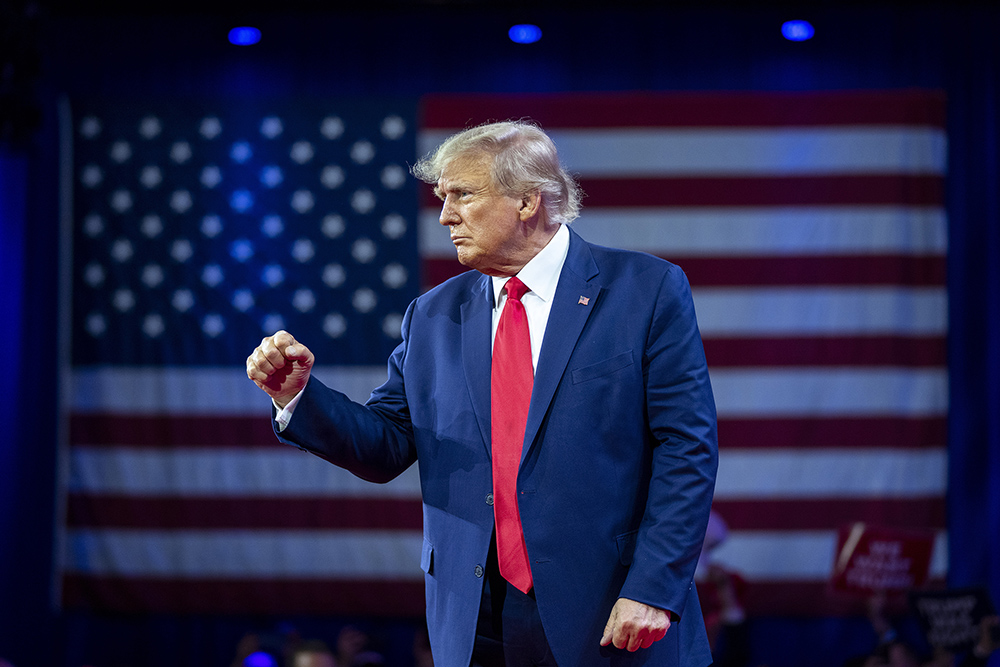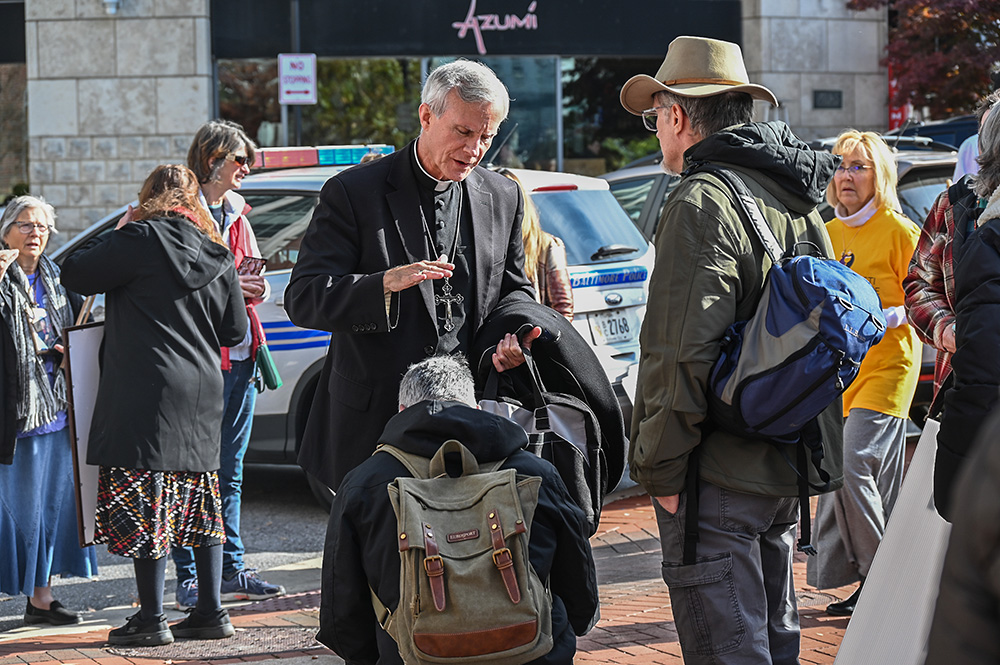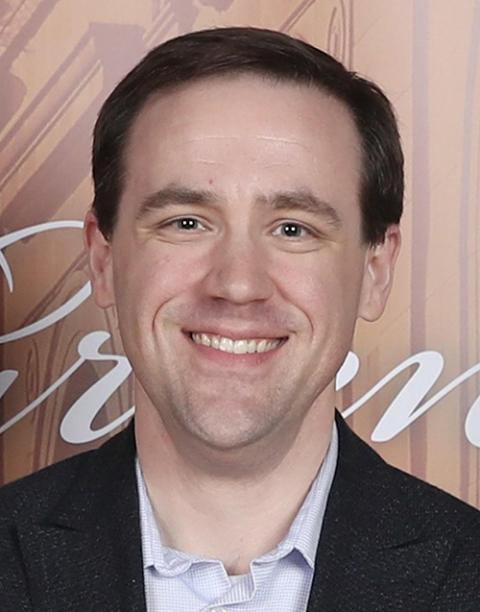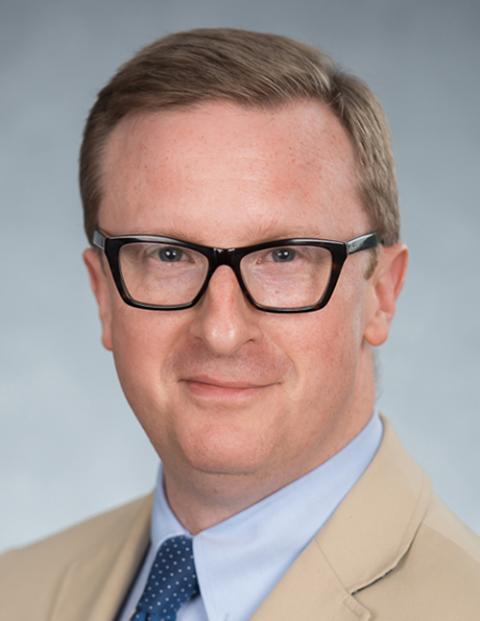
Former President Donald Trump pumps his fist as he departs after speaking at the Conservative Political Action Conference on March 4, 2023, at National Harbor in Oxon Hill, Maryland. (RNS/AP/Alex Brandon)
In 2017, as Donald Trump settled into the presidency thanks in no small part to broad support from conservative Christians, a Vatican-approved magazine published an article bemoaning the "surprising ecumenism" found among far-right Protestants and Catholics who sought a "theocratic type of state."
Years later, the ideology highlighted by the article — co-authored by a confidante of Pope Francis — is often described using the umbrella term "Christian nationalism." And as the U.S. barrels toward yet another presidential election featuring Trump, most attention has been paid to the Protestant variety: forms of evangelicalism that have become increasingly vocal about a desire to create a particular kind of Christian America.
But the movement's Catholic cousins have also quietly continued to grow. Cousins, plural, because Christian nationalism and related ideas espoused by Catholics don't constitute a unified ideology, experts say. There are hard-liners and extreme voices who self-identify as Christian nationalists — Nick Fuentes and his America First group, for example. There are the extra-ecclesial groups, like Eternal Word Television Network or the now-defunct Church Militant. And then there are Catholic integralists, who often insist they aren't nationalists at all.
"Integralism was operating before any self-understood Christian nationalists were operating," explained Kevin Vallier, an associate professor of philosophy at Bowling Green State University whose new book, All the Kingdoms of the World: On Radical Religious Alternatives to Liberalism, examines Catholic integralism.
The movement, Vallier said, traces its origins to the fall of the Roman Empire, when the Catholic Church took on many of the functions of the state. For generations, popes argued that God ordained two powers: kings to rule "temporal" matters and promote "ordinary natural good," and the church to promote spiritual "eternal goods."
"In many cases, these two divinely authorized institutions will sort of clash," Vallier said. "The question is 'Well, which is superior?' The integralist says that the church is superior ... and that means it can delegate to the state to help enforce its spiritual mission."
The church began to shift away from this idea in the aftermath of World War II — and particularly after the 1962-65 Second Vatican Council — but there has been a resurgence of support in the 21st century in conservative academic circles.
The movement found champions in University of Notre Dame's Patrick Deneen and especially Harvard University's Adrian Vermeule, both of whom insist liberalism has failed Western society. They and like-minded "New Right" and "post-liberal" scholars have organized their own conferences, such as a 2022 gathering at the Franciscan University of Steubenville that also featured a speech from then-candidate Sen. J.D. Vance of Ohio. (Representatives for Vance did not respond to questions about whether he supports Catholic integralism.)
Integralist ideas sometimes directly conflict with ideals of self-identified Christian nationalists. Integralists are often deeply supportive of immigration, for instance, and tend to shy away from the political violence endorsed by some extreme Christian nationalists, who exhibit higher support for political violence in polls than the average American.
Advertisement
According to Vallier, integralists prefer a "soft power" approach to exerting Christian influence over society.
"There's the sense that the liberal order is so corrupt that elite Catholics have to find positions of influence and use them in a kind of noble and appropriate way," he said.
Vermeule, who previously clerked for Supreme Court Justice Samuel Alito and was appointed in 2020 by Trump to the Administrative Conference of the United States, has written about the importance of a Christian "strategic adviser" to people in power, citing examples from the Bible where religious figures advised "pagan kings."
And while Vermeule has argued that "nationalism, in itself, is not a cause to be celebrated," he has conceded that nationalism can be a "second-best defensive strategy" against liberalism.
Indeed, for all their differences, integralism shares many of the same policy goals as popular forms of Christian nationalism. Referring to Christian nationalism as "bargain store integralism," Vallier said the two movements generally find common cause when it comes to opposition to abortion and support for blasphemy laws, blue laws and banning pornography.
And support for Trump.
"All of these vectors converge at Trumpism," said Steven Millies, professor of public theology at the Catholic Theological Union.
Many prominent integralists and hard-line Christian nationalists ultimately share support for Trump, whom Vermeule has likened to Hungarian Prime Minister Viktor Orban. Vallier has stated previously that integralists once viewed Trump as a figure similar to Constantine.
Support for Trump is foundational for hard-core Catholic Christian nationalists. People waving flags branded with the America First logo were among the first to enter the Senate chamber during the Jan. 6, 2021, attack on the U.S. Capitol. (Fuentes himself did not enter the Capitol that day.) Fuentes, meanwhile, often uses extreme rhetoric widely decried as racist and antisemitic on his various internet livestreams, such as calling for "Catholic Taliban rule."
There are also prominent Catholics who champion forms of Christian nationalism that are fairly indistinguishable from Protestants who have rallied around Trump. This includes former Trump adviser Michael Flynn, a Catholic who has headlined a traveling Christian nationalist roadshow known as the ReAwaken America Tour and promoted Christian nationalist organizations.
Similarly, onetime Trump aide Steve Bannon, who is also Catholic, has identified himself as a "proud Christian nationalist" and described the U.S. as a "new Jerusalem."
But according to Millies, Christian nationalism is "a little imprecise" for assessing some trends within politicized conservative Catholicism, particularly "extra-ecclesial groups" that operate outside of official Catholic authority. He pointed to the controversial (and recently defunct) media group Church Militant, as well as Eternal Word Television Network, a massive, conservative-leaning Catholic media conglomerate based in Alabama.

Bishop Joseph Strickland prays over an individual near the United States Conference of Catholic Bishops meeting in Baltimore Nov. 15, 2023. (RNS/Jack Jenkins)
Millies also noted the heightened profile of "influencer bishops" such as Bishop Joseph Strickland, who built a robust conservative following while taking up causes such as opposition to COVID-19 vaccines.
These movements and leaders often converge, Millies said, around Trump: Church Militant and EWTN have long been accused of bolstering the former president's positions on issues such as immigration, and Strickland offered a prayer at a faith-themed event held in the lead-up to the Jan. 6, 2021, attack on the U.S. Capitol.
These groups and figures would not necessarily describe themselves as Christian nationalists, Millies said. But they have "figured out that they can appropriate a Catholic brand" and raise "a remarkable amount of money" while "selling a very patriotic-seeming message that tells a story about the happy and uncomplicated meeting between Catholic faith and the American style of constitutional government."
"The outsized influence of these lay Catholics is a new kind of problem for a church that wants to retain its control over the meaning of what the word Catholic is," Millies said.
None of these movements is operating under the endorsement of the Vatican. Most are actively in tension with church leaders, operating outside the church hierarchy, or both.
'The outsized influence of these lay Catholics is a new kind of problem for a church that wants to retain its control over the meaning of what the word Catholic is.'
—Steven Millies
Church Militant was asked by a local diocese to strip "Catholic" from its name early in its existence, for instance, and EWTN is said to have attracted thinly veiled criticism from Pope Francis himself: The pontiff is believed to have been referring to EWTN when he decried the "work of the devil" in 2021.
Meanwhile, Strickland, despite his fame in conservative circles, was chastised by Vatican leaders before eventually being removed from his diocese late last year.
At least one U.S. bishop has also spoken out against Catholics who invoke these ideologies.
"There's no legitimate teaching of Catholicism that justifies Christian nationalism," Bishop John Stowe, who oversees the Lexington Diocese in Kentucky, said in a phone interview.
He later added: "I don't know what Steve Bannon would claim to be the basis for how this is compatible with his Catholic faith."
Stowe also had harsh words for groups such as Church Militant that have attacked the church's work with immigrants, and called integralism "concerning," saying it "seems so out of place in the United States."
"It's hard to understand a legitimate either intellectual or legitimate philosophical grounding for something like that," he said.
But Stowe also suggested that these groups are better at political messaging than they are at capturing the imagination of rank-and-file Catholics.
"I've seen it on the internet. I've seen articles about groups or places. I've seen hints of it in some of the Catholic Trump material," he said, referring to Catholic Christian nationalism. "But I have not seen it either in my diocese, or any communities that I have visited or been connected to."
Even so, Vallier argued that when it comes to building power, perhaps the most important question isn't how these various factions resemble each other, but what they are united against.
"There is a sense that, 'OK, can Catholics and Protestants be on the same side?' Because even if, you know, they're going to end up battling one another eventually under integralism, at least, they're going to ask to kind of band together against the left," Vallier said.
[This story was reported with support from the Stiefel Freethought Foundation.]









